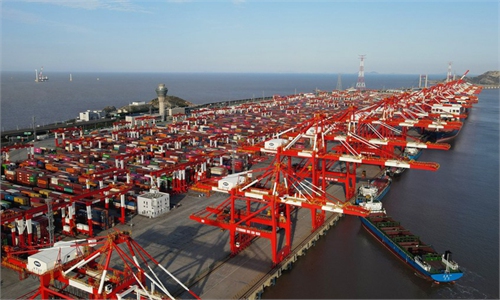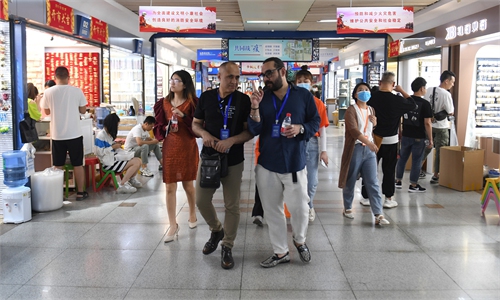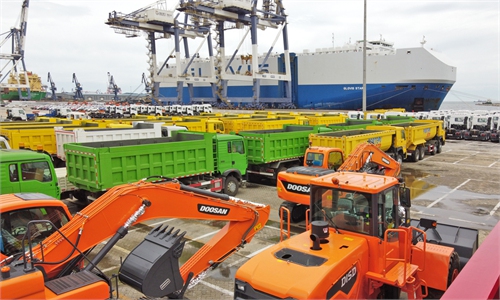WTO puts Chinese auto in the fast lane
From a nation of bicycles, China now leads on four wheels

As China has become "a nation on wheels," the country's automotive industry offers a great case study on how the Chinese economy achieved integration with global markets and contributing to global prosperity.
In 2001, China produced merely 2.34 million cars. Only six years later, that number doubled to reach 7.27 million, with China becoming the world's largest automaker for 12 consecutive years, producing a total of 25.31 million vehicles in 2020.
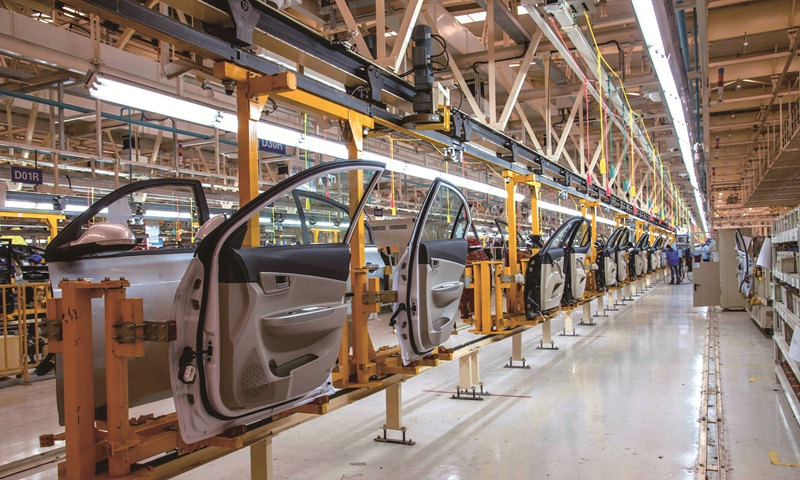
An automobile assembly line in China Photo: VCG
Honoring its commitment to the WTO, China has been gradually lowering tariffs on cars with the duty on imported passenger cars nearing global levels of 25 percent in 2006.
Today, the Chinese market is a core market for global automakers. At the 4th China International Import Expo held in Shanghai in November this year, the top global 10 auto brands were all present, competing for display space.
"I still feel that excitement when I splashed 120,000 yuan ($18,894) - more than two years of savings - on a Volkswagen Santana sedan," a Beijing resident surnamed Hong told the Global Times on Wednesday, adding that being able to afford a car in 1998 was relatively rare among Chinese families.
"China's accession to the WTO enabled China to join the global trading system. From the perspective of the automobile industry, the growing wealth of Chinese people, especially the middle class, provided a huge market for global auto manufacturers," he said.
"Now, in China's small, medium and large cities and even in rural areas, cars are no longer luxury goods, and almost every family can afford one," Hong said.
Road to strength
In the 1990s, when China's auto industry still lagged behind developed countries, entering the WTO and opening the domestic auto industry to sophisticated foreign players sparked heated debate from those within the industry.
Tong Zhiguang, China's chief trade negotiator between 1991 and 1993 and former vice-minister of trade, who has passed away, was concerned at that time that China's emerging auto industry would be heavily impacted in face of opening-up, but also accepting that it was the price that must be paid to pave the way for future progress and reform, according to a report by the Shanghai Observer.
Top executives of major state-owned auto enterprises were said to be "terrified" and "scared lifeless" by the news of accession to the WTO as they were afraid of the possible consequences, that they could not survive competition from stronger foreign brands.
Despite the majority of voices expressing concerns, some industry participants were not that pessimistic. In contrast, they were expecting that the nation's door could be opened wider to foreign investment.
Cui Dongshu, secretary-general of the China Passenger Car Association (CPCA), who worked at Tianjin Xiali plant, told the Global Times that his firm did not feel so much pressure about China's joining the WTO.
"Any industry that cannot be nurtured in an open and free environment will not grow well. Those that are over protected will lag behind," Cui said.
According to Cui, having access to the most advanced international car-making technology was key to China's auto industry's growth, and he believed that Chinese players would not necessarily remain in the lower hand when partnering with foreign peers because of the former's advantage in optimizing development path based on rich experience in local market.
In the year following China's accession to the WTO, the first Toyota passenger car in China - featuring the Japanese automaker's most-advanced technologies - began to be manufactured through a Toyota and Tianjin FAW Xiali Corp joint venture (JV).
Over the years, the opening-up policy proved to be a correct one for the Chinese automotive industry, as industry players began to learn and benefit from working with their foreign partners.
In order to ensure carmakers remained competitive, China imposed ownership restrictions in 1994, limiting foreign carmakers to owning no more than a 50 percent share of any local JV.
The industry policy remained in place until 2018 when the National Development and Reform Commission, the country's economic planner, announced further reform within the auto industry: it would remove foreign ownership caps for companies making fully electric and plug-in hybrid vehicles in 2018, for makers of commercial vehicles in 2020, and the wider passenger car market by 2022. The new measures marked the maturity of the Chinese auto sector.
In 2018, US electric vehicle giant Tesla signed an agreement with the Shanghai municipal government to open a plant to make Tesla vehicles, making it the first non-Chinese auto company with a solely-owned subsidiary in China since the 1990s.
Compared to releasing a catfish in a placid pond, the bold move marked a milestone in pushing ahead a more open auto industry in which domestic rivals will be forced to speed up their integration of new technology.
The Tesla Shanghai Gigafactory, making the electric Model 3 sedans and Model Y sport-utility vehicles, has a manufacturing output of over 450,000 vehicles annually, compared to up to 600,000 at its Fremont factory - Tesla's main US production facility.
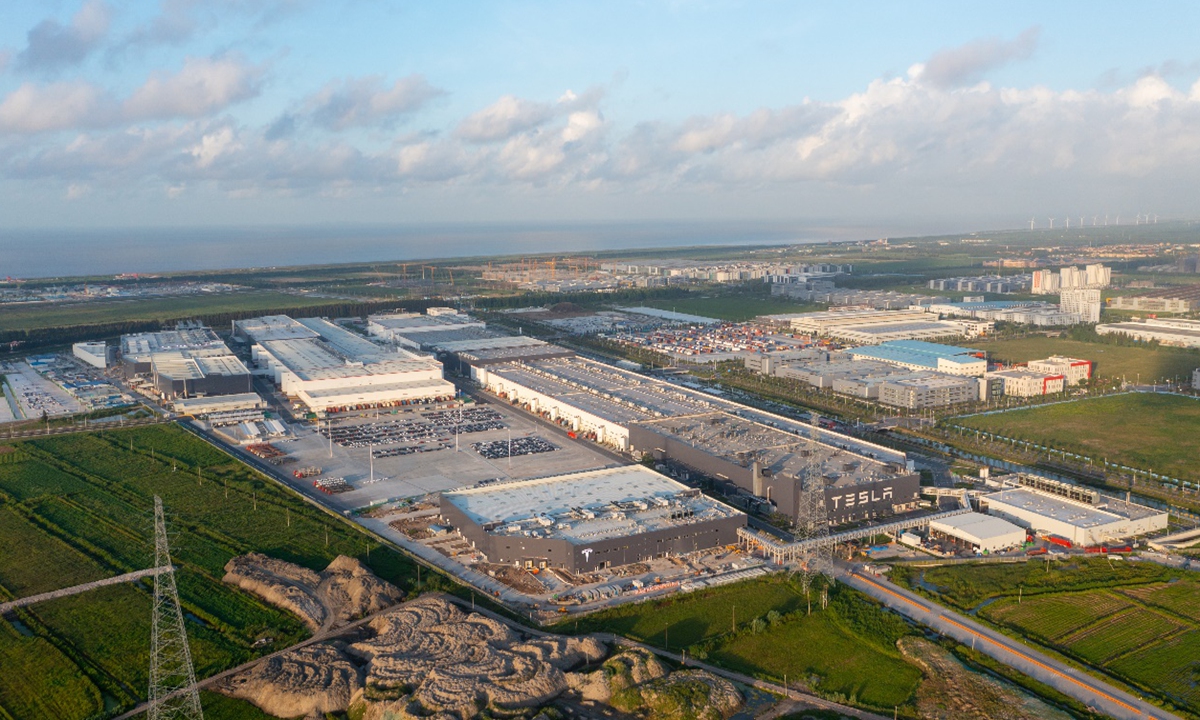
Tesla Shanghai Gigafactory Photo: Courtesy of Tesla
In addition to serving domestic market, made-in-China Tesla vehicles are also exported to international markets including Germany and Japan. The US automaker witnessed sales of 52,859 cars in the Chinese mainland market in November including 21,127 cars exported from the Shanghai factory, latest data from the CPCA revealed on Wednesday.
"Despite the current mainland auto market still prominently dominated by foreign auto brands, the era of the 'wolf is coming' mentality has gone because we have accumulated key technologies and experience especially after entering the WTO," Cui said, adding that it is appropriate to take further opening-up moves and he believed it is an irreversible trend.
Hello the world!
Just as China opened up its auto industry to the world, industry players also gained larger access to global markets, in a two-way channel facilitated by China's accession to the WTO.
A number of domestic auto companies, seasoned by the fierce competition in the domestic market, have gained enough strength to explore opportunities outside of China. By 2021, these efforts have yielded great results.
"Without China's accession to the WTO, there wouldn't be a Geely," Victor Yang Xueliang, Senior Vice President of Zhejiang Geely Holding Group, told the Global Times in an email interview on Wednesday.
Geely was the first private Chinese company to obtain a license to produce passenger vehicles. China issued such licenses to only a number of domestic companies around the time of its accession to the WTO.
At that time, due to foreign companies' strength in product, technology, talent and branding, 90 percent of the market was held by either vehicles produced by JV auto plants or imported ones.
It was under this challenging environment that domestic automakers were forced to grow up quickly. Geely, among a number of other domestic brands, survived this baptism of fire and emerged from a small company with sales revenues in several hundreds of millions yuan in 2001 to a Fortune Global 500 company with 325.6 billion yuan in operating revenues in 2020.
Today, domestic brands have matured. In the first half of 2021, they accounted for 42 percent of domestic market share.
"In exchange for the price of opening up the domestic market, the accession to the WTO presented Chinese companies with the rare opportunity of going global," Yang said.
"It has really been an eye-opener, the whole world right before us. And we are able to take part in international competition, invest globally and tap into global financial markets and talent pool," Yang said.
After summing up its investment experience in Malaysia, Geely surprised the market with its acquisition of Swedish auto giant Volvo from Ford Motor in 2010, and surprised the market for another time by turning that merger a success.
Yang said Geely's internationalization process would not have been possible if China did not join the WTO in 2001. Today, the company is able to produce models that can compete head-to-head in key product classes by JV auto makers in the domestic market, as well as becoming a joint owner of the smart brand and a near-10-percent stake in Daimler AG.
The company is also making forays in the European markets to directly compete with foreign car makers with its high-end LYNK & CO brand, having shipped 10,000 finished vehicles to Europe since 2020.
Geely is considered a leader, but it is not alone. The group of successful domestic brands are growing, and many Chinese brands including Great Wall Motor and SAIC are expanding their global footprint.
